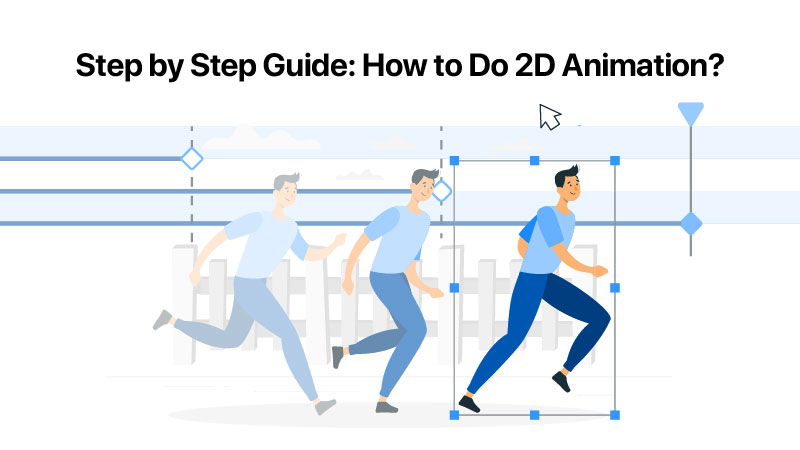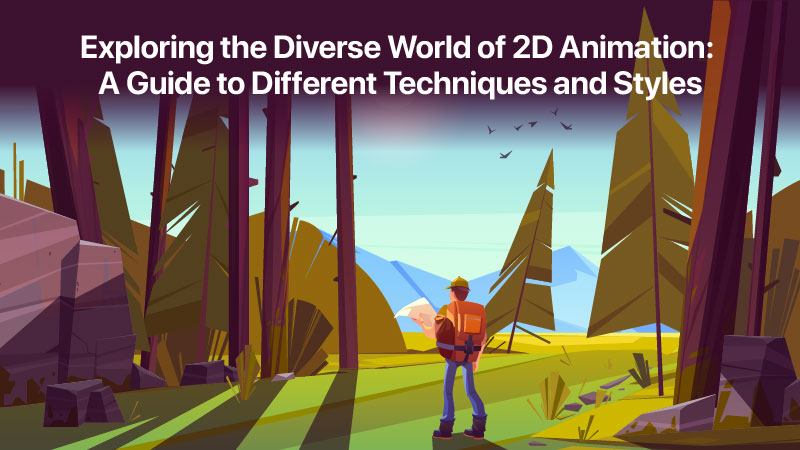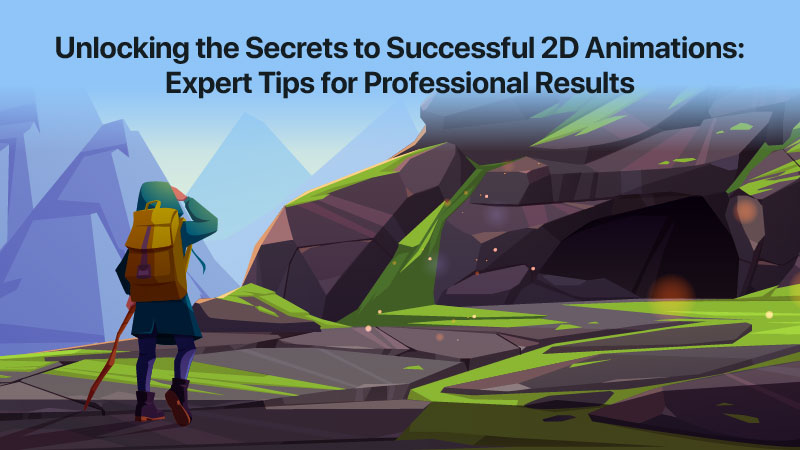Mastering the Art of 2D Animation: Techniques and Tools
2D animation can be incredibly rewarding and a great way to express yourself creatively. With the right tools and techniques, anyone can become a master of 2D animation. Through this blog we will try and explore the essential techniques and tools for creating professional-looking 2D animations.
Step by Step Guide: How to Do 2D Animation?
2D animation is an art form that has been around for many years and has been used in films, television shows, video games, and more. It involves creating two-dimensional images that move and interact with each other. In contrast to 3D animation, which creates three-dimensional images, 2D animation is usually created using vector graphics or raster graphics. Vector graphics are composed of lines and curves, while raster graphics are composed of pixels.
2D animation can be used to create a variety of effects, from realistic movements to exaggerated cartoon-like movements. It is also an excellent way to tell stories and deliver messages in a creative way. However, it is an art form that requires skill, patience, and an eye for detail.

Overview On How to Learn 2D Animation Process
The process of creating 2D animation involves several steps. First, you need to decide on a concept and create a storyboard, which is a visual representation of your idea and how it will be presented. Once you have a storyboard, you can start creating the actual animation.
The next step is to create the keyframes, which are the frames that will be used to create the motion of your animation. After creating the keyframes, you will need to add in-between frames. This process involves adding frames between the keyframes to create smooth transitions.
Once you have created the frames, you can start adding color, texture, and effects to your animation. This step is all about adding the details that will bring your animation to life. Finally, you will need to render your animation, which is the process of creating a final version that is ready to be viewed.
Types of 2D Animation Techniques
There are some specific methods and techniques that’re incorporated in digital 2D animations. A few of them are as follows:
Storyboarding
The first step in creating a 2D animation is to create a storyboard. This is where you will sketch out your ideas and sequence of events and plan out your animation shot by shot. Storyboarding is important as it helps you visualize your animation and allows you to identify any potential issues before you start animating.
Keyframe Animation
Keyframe animation is the process of creating a sequence of frames in which each frame represents a key moment in the animation. By creating a keyframe animation, you can create the illusion of motion through animating the movement between frames. This technique is used extensively in 2D animation to create fluid, lifelike visuals.
Squash and Stretch
Squash and stretch is a technique used in 2D animation to give weight and flexibility to the object. By exaggerating the movement, you can determine probable weight and make the movement more believable by calculating how it could’ve been in real life.
Time Management
Timing is a critical aspect of 2D animation. It determines the speed at which an object moves and the amount of time it takes to complete a movement. Getting the timing right is essential for creating believable and engaging animations.
Pose-to-Pose Animation
Pose-to-pose animation involves creating a series of key poses that represent the movement of an object. These poses are then connected with in-between frames to create a smooth and continuous animation. This technique is commonly used in 2D animation to create complex movements such as fighting scenes or dance sequences.
Get your Free 30 Minute strategy session with an experienced digital animators
Don't Be Shy, Say Hi!

Essential Tools for 2D Animation
To get started with 2D animation, you will need a drawing tablet. Drawing tablets are essential tools for 2D animators. They allow you to draw directly onto the computer screen and provide a level of precision and control that is difficult to achieve with a mouse or trackpad. Popular drawing tablet brands include Wacom, Huion, and XP-Pen.
2D Animation Software
There’re many 2D animation software available in the market, each with its own set of features and capabilities. Some of the most popular software includes Adobe Animate, Toon Boom Harmony, and OpenToonz. These software packages provide a range of tools and features to help you create professional-level 2D animations.
Drawing Tools
Traditional drawing tools such as pencils, pens, and paper are still important in 2D animation. They are useful for sketching out ideas and creating rough drafts before moving on to the digital medium. Many 2D animators still prefer to use traditional drawing tools, as they offer a tactile and intuitive experience.
Reference Material
Reference materials such as photographs, videos, and images are essential for creating accurate and realistic animations. They can provide a wealth of information on how objects move and interact with each other in the real world, which can be translated into your animations.
Sound Editing Software
Sound is an important aspect of 2D animation. Sound effects and music can greatly enhance the overall experience of animation. Software such as Audacity and Adobe Audition can be used to edit and create sound effects and music tracks for your animations.
Tips for Creating Professional 2D Animations
Creating professional-looking animations requires practice and dedication. Here are a few tips to help you create the best possible animations:
First, hone your animation skills. To become a master of 2D animation, you need to practice your drawing and animation skills regularly. Try creating new animations often and learn from your mistakes.
Second, experiment with different techniques. There are many animation techniques available, and you should try different ones to find the methods that work best for you.
Third, take your time. Animations take time and effort to create, so avoid rushing through the process. Take your time to create the best possible animation.
Finally, use reference materials. Reference materials can be a great way to learn more about animation and get inspiration for your animations. Look for reference images online, or find books or movies with similar styles.
Overall, these tips can help you improve your animation skills and create better-quality animations. With dedication and practice, you can master the art of animation and produce exceptional work.
Common Mistakes to Avoid When Doing 2D Animation
To create the best possible animations, you need to avoid common mistakes. Here are some of the most common mistakes to avoid when doing 2D animation:
First, avoid rushing through the process. Animations take time and effort to create, so take your time to get it right.
Second, don’t hesitate to iterate. Iteration is a crucial part of the animation process, so don’t be afraid to make changes to improve your animation.
Third, don’t be afraid to ask for help. If you’re stuck or need assistance with a particular aspect of your animation, seek help from the many resources available online or in-person.
Finally, don’t forget to have fun. Animation can be a lot of fun, so enjoy the process.
By avoiding these common mistakes, you can create better-quality animations and improve your skills. Remember to take your time, iterate, seek help when needed, and have fun. With practice and dedication, you can become a skilled 2D animator.

Illustrate Your Concept
2D animation is an art form that requires skill, patience, and attention to detail. With the right tools and techniques, anyone can become a master of 2D animation. In this blog article, we’ve explored the essential methods and tools for creating professional-looking 2D animations. We’ve also discussed some tips for creating professional-looking animations and common mistakes to avoid. Now that you have a better understanding of how to do 2D animation, you can start creating your animations!
If you’re looking for more guidance on mastering the art of 2D animation, Cloud Animations’ team of experienced animators is here to help. Get in touch with us today to learn more about our services and how we can assist you in creating professional-looking animations.
By using the right tools, techniques, and tips, you can create high-quality 2D animations that will impress your audience. With practice and dedication, you can develop your skills and produce exceptional work. So, go ahead and start creating your animations today!
Besides creating 2D animation, Cloud Animations also offer a wide range of services, like video editing, logo animations, architectural visualization, CGI-VFX, Whiteboard animation videos, and 3D animation. So look up our website services page and avail your desired package now.




